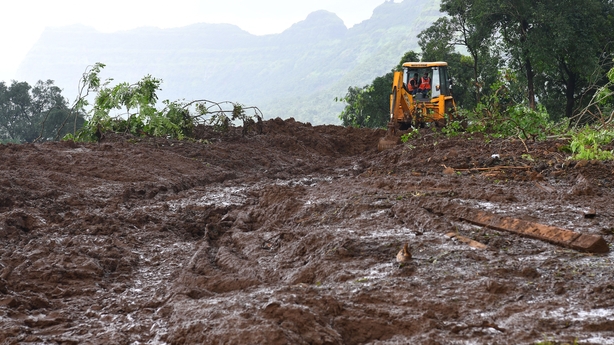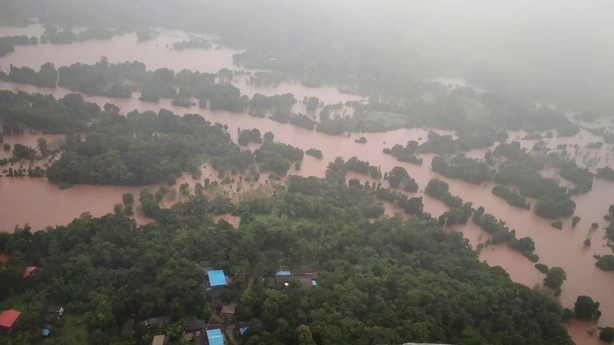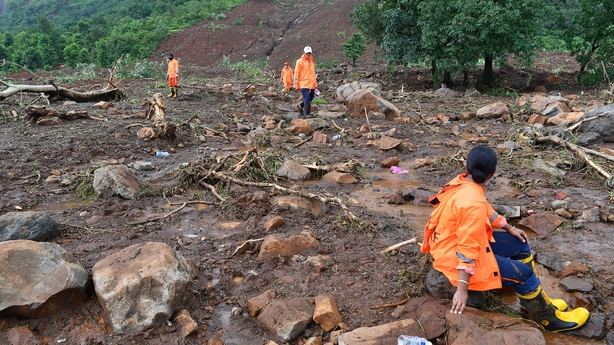The death toll from floods and landslides caused by torrential monsoon rains in India has risen to 159, officials said, as rescuers search for dozens of missing people.
Floods have inundated the country’s western coast since Thursday, with the Indian Meteorological Department warning of more rain over the next few days.
Floods and landslides are common during the treacherous monsoon season in India, which also often sees poorly constructed buildings marred after days of incessant rain.
Experts say climate change has caused an increase in the frequency and intensity of the annual flood.
In Maharashtra, 149 people were killed, including more than 40 in a massive landslide that hit the hillside village of Thalia, 250 kilometers southeast of Mumbai, on Thursday.
Residents told AFP that dozens of homes were flattened within minutes, only two concrete buildings left, and electricity was cut off.

In the landslide and flood affected Satara district, 28 more bodies were found leaving 41 dead.
In parts of Chiplon, the water level rose to nearly six meters after 24 hours of continuous rain. Since then water levels have started to recede.
«Rain, floods and waters are not new to people here but what happened this time was unimaginable and they could not even save their belongings because of the rapid rise in the water,» Maharashtra Chief Minister Udhav Thackeray told reporters after visiting Chaplun.
Eight patients at the local Covid-19 hospital were also reported to have died after power was cut off from ventilators.
Pointing to the sludge and debris around him, a shopkeeper told Indian news station NDTV: «The water level reached the roof of my shop, and there was a lot of water inside.»
«All the shops in this area are completely damaged. The flood has left a lot of soil behind, and we can’t even resume work.»
About 230,000 people have been evacuated from across the state amid the harsh conditions. Rescue workers were working in the waist-deep mud to search for the 100 still missing people with the help of excavators.
Officials in neighboring Goa said it was feared that a woman had drowned in the floods, while Prime Minister Pramod Sawant said it was the worst flood since 1982.
Ajit Roy, an official in North Goa, said the floodwaters have since receded as the evacuees returned to their homes.
In the coastal plains of Maharashtra and Goa, flood water levels remained high after rivers overflowed their banks and forced panicked residents to seek safety on rooftops and upper floors.
To the south in Karnataka, the death toll rose to nine overnight, with four more missing, officials said.
Power supplies were disrupted in 11 affected districts and crop losses occurred across large areas of land.
Climate change is leading to a warming of the Arabian Sea, said climate scientist Roxy Matthew Cole of the Indian Institute of Tropical Meteorology.
He said that higher water temperatures caused the air above to warm up and retain more moisture, which led to more extreme precipitation events.
«We’re seeing a threefold increase in large-scale extreme precipitation events … since 1950,» Cole told AFP, citing a study he co-authored and published in the journal Nature.
He added that South Mumbai’s hill station, Mahabaleshwar, recorded 594 mm of rain on Friday – the highest since records began a century ago.
«In recent years, the impact of climate change (on the monsoon in India) has been more pronounced. In fact, what has happened in Europe, China and the rest of the world is similar to what is happening in India.»
In a separate incident in northern India, nine people were killed and three others seriously injured after their vehicle hit a falling stone in the mountainous Kinur district of Himachal Pradesh.
Officials said the rockslide – captured in sensational video footage shared on social media – was not caused by monsoon rains but by loose soil due to a lack of vegetation.

«Lector profesional. Jugador galardonado. Aficionado a los zombis. Adicto a las redes sociales. Experto en tocino. Erudito en Internet»

